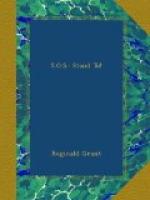Nature’s primal law asserted itself and I dragged the remains of my best-loved friend several yards away and took from his pockets all his belongings and trinkets, and when I came to the photograph, partly stained with his heart’s blood, hot, scalding tears blinded my eyes, and in deference to my dead friend’s desire, I retained the photo, intending to get the news and picture back to her—in person, if possible. The O.C. took charge of the balance of his effects.
Disregarding all thought of my own peril from the unexploded shell which lay at the mouth of our dugout, I ran down the steps and got a blanket, in which I wrapped the poor headless body, and then reported to the O.C. and received orders to keep my men away from the spot for twelve hours. I hastened to the cookhouse and imparted the news to the men, as well as the orders. Heartfelt expressions of regret came from all, for in spite of his constitutional nervousness, Billy was a prime favorite. But I knew that I was the only one with whom the pain and sting would live; the men were so calloused by such happenings that they no longer made a lasting impression.
That was the longest and dreariest day I ever remember throughout my three years of campaigning. No thought of my turn coming entered my head, as I had so schooled myself into the belief that Fritz could not make a shell for me that I had long since ceased to give the matter any consideration whatsoever.
The day’s work kept me from giving way to grief, and at nine o’clock that night, when in the cookhouse, I heard a whistle and someone shouted my name. It was our O.C., Major Wright. I hastened to his dugout.
“Sergeant Grant, I want you to take a party of six and make a grave and bury poor McLean. I know something of the relationship that existed between you, and I know that you will spare no effort to see that he is properly buried. While you are working I will try and fashion a cross for him. Report as soon as you are finished.”




